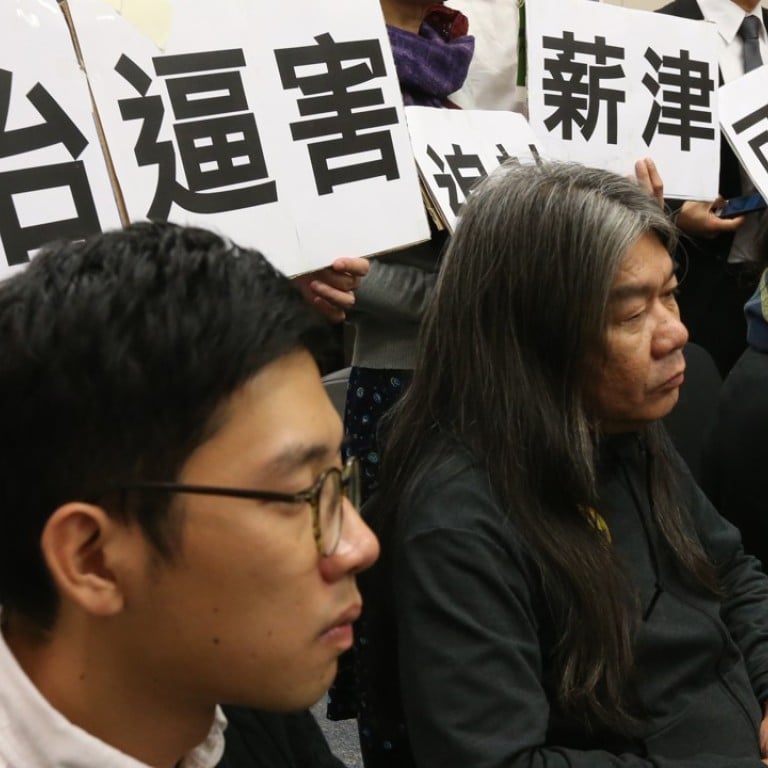
Legco demands four ousted lawmakers in oath-taking saga return up to HK$3.1 million each
Bills will be backdated to their first day in office despite them working for nine months before Hong Kong’s High Court stripped them of their seats on July 14
The ex-lawmakers protested the move, saying it was equivalent to “political persecution” as the bills would be backdated to their first day in office – October 1 last year – despite them carrying out their work for nine months before Hong Kong’s High Court stripped them of their seats on July 14.
At a press conference on Monday, Nathan Law Kwun-chung, “Long Hair” Leung Kwok-hung, Lau Siu-lai and Edward Yiu Chung-yim argued that their participation in Legco votes and meetings meant their salaries and allowances in the months preceding the court’s decision should not be clawed back.
Court ruling disqualifying Hong Kong lawmakers over oath-taking controversy ‘a declaration of war’
Now 24 and the city’s youngest-ever lawmaker until he was disqualified, Law added: “The decision is totally ridiculous and unacceptable, as the four of us had worked hard for the electorate for months.”
On Monday, Legco President Andrew Leung Kwan-yuen confirmed that the voting records of the four ousted legislators would still be deemed legitimate.
But, “considering legal advice that public money is involved, it is the [Legco] Commission’s duty to recover the funds,” Andrew Leung said, adding that the amounts to be recovered from each person ranged from HK$2.7 million to HK$3.1 million.
He said the four would have a “reasonable time frame” of four weeks to respond to Legco’s legal demand, after which Legco would consider its next move.
I won’t target more Hong Kong pan-democrats in oath-taking saga, Carrie Lam says
If the four ex-lawmakers refuse to pay up, the Legco Commission, which handles Legco’s administrative matters, could consider taking legal action, just as it did with a pair of ex-lawmakers Sixtus Baggio Leung Chung-hang and Yau Wai-ching.
The pair were stripped of their seats last November for oath-taking antics that featured anti-China slogans and banners in the Legco chamber.
Andrew Leung said based on advice from external legal counsel and in-house lawyers, voting records and lawmakers’ salaries did not come under the same law. The former was regulated by local legislation, while the latter was defined by the national parliament.
China’s top body lays down law on Hong Kong oath-taking
“We understand the prospect of legal challenges, so we have considered our move in a very cautious manner,” Andrew Leung said.
Lau rebutted his claim.
“Leung’s decision totally disregards Legco work and the monetary burden [involved in the work],” the ex-lawmaker said.
“We were acting on behalf of voters to hold the government accountable, which of course involved expenditure on research and policy analysis, as well as on recruiting assistants.”
Oath-taking antics: The acts that got six Hong Kong lawmakers disqualified
“Long Hair” Leung, who described the Legco commission’s move as a “clear illustration of political persecution”, was disqualified for holding a yellow umbrella – a symbol of the Occupy movement – while taking the oath.
Law’s oath was considered void as he changed his tone when saying “People’s Republic of China” while Lau paused for too long in between words.
Yiu, who included additional lines when reciting his oath, pressed Legco on how the former lawmakers’ contribution to legislative work would be accounted for.
“Insisting our [votes] would continue to be valid while dismissing our right to our salary is no different from stealing our intellectual property,” Yiu said.

